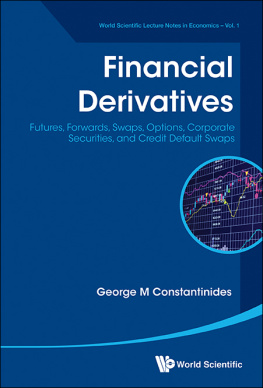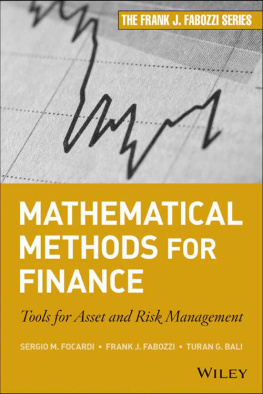THE OXFORD HANDBOOK OF
CREDIT
DERIVATIVES
OXFORD HANDBOOKS IN FINANCE
S ERIES E DITOR : M ICHAEL D EMPSTER
THE OXFORD HANDBOOK OF BANKING
Edited by Allen N. Berger, Philip Molyneux, and John O.S. Wilson
THE OXFORD HANDBOOK OF CREDIT DERIVATIVES
Edited by Alexander Lipton and Andrew Rennie
THE OXFORD HANDBOOK OF
CREDIT
DERIVATIVES
Edited by
ALEXANDER LIPTON
and
ANDREW RENNIE


Great Clarendon Street, Oxford, OX2 6DP,
United Kingdom
Oxford University Press is a department of the University of Oxford.
It furthers the Universitys objective of excellence in research, scholarship,
and education by publishing worldwide. Oxford is a registered trade mark of
Oxford University Press in the UK and in certain other countries
Oxford University Press 2011
The moral rights of the author have been asserted
First published in paperback 2013
First Edition published in 2011
Impression: 1
All rights reserved. No part of this publication may be reproduced, stored in
a retrieval system, or transmitted, in any form or by any means, without the
prior permission in writing of Oxford University Press, or as expressly permitted
by law, by licence or under terms agreed with the appropriate reprographics
rights organization. Enquiries concerning reproduction outside the scope of the
above should be sent to the Rights Department, Oxford University Press, at the
address above
You must not circulate this work in any other form
and you must impose this same condition on any acquirer
British Library Cataloguing in Publication Data
Data available
Library of Congress Cataloging in Publication Data
Data available
ISBN 9780199546787 (hbk)
ISBN 9780199669486 (pbk)
Printed in Great Britain on acid-free paper by
Ashford Colour Press Ltd., Gosport, Hampshire
Links to third party websites are provided by Oxford in good faith and
for information only. Oxford disclaims any responsibility for the materials
contained in any third party website referenced in this work.
S ERIES E DITORS P REFACE
Recently two series of Oxford Handbooks covering financial topics have been merged into one under a single editorship those in Finance found under Business and Economics and those in Quantitative Finance found under Mathematics. This is as it should be, for in spite of all the accusations regarding their role in the recent crisis and recession, financial services are both necessary and critical to the successful development of a global economy facing environmental and pension crises on top of the current one. It can also be argued that banking, insurance and fund management are the last post war industries to go high tech and that the esoteric topics involved need exposition to a more general audience than simply that of their creators. The aim of this handbook series is therefore to cover recent developments in financial services, institutions and markets in an up to date, accurate and comprehensive manner which is clear and comprehensible to the interested reader. This will be achieved by careful choice of editors for, and exacting selection of contributors to, each handbook.
It is my hope that over time the volumes in this series will help to create a better understanding of financial topics by the educated public, including financial services managers, regulators and legislators. Such an understanding appeared to be lacking in the run-up to the recent crisis, but it will be crucial to successful management of the global economy in the future.
Michael Dempster
Edward Altman is the Max L. Heine Professor of Finance at the Stern School of Business, New York University, and Director of the Credit and Fixed Income Research Program at the NYU Salomon Center. Dr Altman has an international reputation as an expert on corporate bankruptcy, high yield bonds, distressed debt, and credit risk analysis. He was named Laureate 1984 by the Hautes tudes Commerciales Foundation in Paris for his accumulated works on corporate distress prediction models and procedures for firm financial rehabilitation and awarded the Graham & Dodd Scroll for 1985 by the Financial Analysts Federation for his work on Default Rates and High Yield Corporate Debt. He was inducted into the Fixed Income Analysts Society Hall of Fame in 2001 and elected President of the Financial Management Association (2003) and a Fellow of the FMA in 2004, and was amongst the inaugural inductees into the Turnaround Management Associations Hall of Fame in 2008. In 2005, Dr Altman was named one of the 100 Most Influential People in Finance by Treasury & Risk, Management magazine and is frequently quoted in the popular press and on network TV. Dr Altman is an adviser to many financial institutions including Citigroup, Concordia Advisors, Paulson and Company and Investcorp, as well as on the Boards of the Franklin Mutual Series Funds and, until recently, Automated Trading Desk, Inc. He is also Chairman of the Academic Advisory Council of the Turnaround Management Association.
lie Ayache was born in Lebanon in 1966. Trained as an engineer at lcole Polytechnique of Paris, he pursued a career of option market maker on the floor of MATIF (19871990) and LIFFE (19901995). He then turned to the philosophy of probability (DEA at la Sorbonne) and to derivative pricing, and co-founded ITO 33, a financial software company, in 1999. Today, ITO 33 is the leading specialist in the pricing of convertible bonds, in the equity-to-credit problem, and more generally, in the calibration and recalibration of volatility surfaces. lie has published many articles in the philosophy of contingent claims. He is the author of The Blank Swan: the End of Probability, forthcoming.
Alexander Batchvarov, Ph.D., CFA has headed the international structured finance effort for Merrill Lynch since 1998, having prior to that worked in Moodys structured finance and sovereign teams in New York and London, in the emerging markets group of Citibank in New York, and in academia. He has worked extensively in both developed and emerging markets of Europe and North America, Latin America and Asia, Eastern Europe, and the Middle East. He has authored and edited several books on mortgage markets and mortgage finance in Europe, Asia, and Latin America, on hybrid products and has contributed numerous chapters to publications on structured finance. He holds an M.Sc. Economics, an MBA in Finance, and a Ph.D. in Economics and is a CFA Charter holder.
Arthur Berd is the Head of OTC and Macro Vol Strategies at Capital Fund Management, a hedge fund with offices in Paris and New York, specializing in systematic investment strategies. Prior to that, he was the Head of Quantitative Market Strategies at BlueMountain Capital Management, a leading credit hedge fund in New York. Earlier, Arthur was a Senior Vice President at Lehman Brothers where he was responsible for a variety of quantitative credit models and strategies across corporate bonds and credit derivatives. Before joining Lehman Brothers in 2001, he was a Vice President at Goldman Sachs Asset Management, focusing on fixed income risk management and quantitative portfolio analysis for cash and CDO products. Dr Berd is a member of the editorial board of the Journal of Credit Risk, and is the founding coordinator of the quantitative finance section of www.arXiv.org , a global electronic research repository. Dr Berd is a charter member of the CFA Institute, the New York Society of Securities Analysts, and Risk Whos Who. He holds a Ph.D. in physics from Stanford University. He is an author of more than thirty publications and a frequent invited speaker at major industry conferences.
Next page







